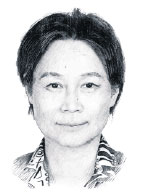
This year, the relationship between China and Japan reached an all-time low since the normalization of diplomatic ties in 1972, and this is reflected in the attitudes of people in both countries toward bilateral ties.
The brief meeting between Chinese President Xi Jinping and Japanese Prime Minister Shinzo Abe during the Asia-Pacific Economic Cooperation meeting in Beijing in November, the first of its kind, suggested a thaw might be on the cards, but destabilizing factors are still hampering bilateral ties from fundamental improvement.
It was, of course, just diplomatic rhetoric. Tokyo's rightist leaders have always been a grave threat to the political mutual trust between China and Japan. And the current Abe administration, of all Japanese governments since the Cold War ended in the early 1990s, has made it clear that Japan wants to be an Asian leader without being confined by the postwar order.
In effect, Abe's attempts to "amend" Japan's pacifist Constitution, whitewash Japan's wartime atrocities, increase its military might and re-investigate the apology issued by former Japanese chief cabinet secretary Yohei Kono in 1993 for Japan's use of "comfort women" during World War II, are all part of Japanese rightist forces' rampant attempts to rewrite history.
Even worse, last year Abe visited the notorious Yasukuni Shrine, which honors 14 Class-A war criminals, offending neighbors and undermining Japan's national image.
The year of 2015, also the 70th anniversary of the end of WWII, is an opportunity for Japan to reflect on itself.
There was also a notable alteration to Japan's security strategy this year. With the absurd excuse of a "China threat", Tokyo finally lifted the ban on its right to collective self-defense in July, following its earlier relinquishment of the "three principles" on arms exports on April 1. The Japanese Cabinet replaced the original principles, which were adopted in 1967, with new ones that allowed Japan to export military hardware and jointly develop weapons with its allies.
It is particularly noteworthy that both of the moves violating the Constitution were simply the Cabinet's resolutions, without being sufficiently and publicly discussed. In other words, Abe was able to forcibly push them through, thanks to the majority his ruling Liberal Democratic Party enjoys in the Cabinet.